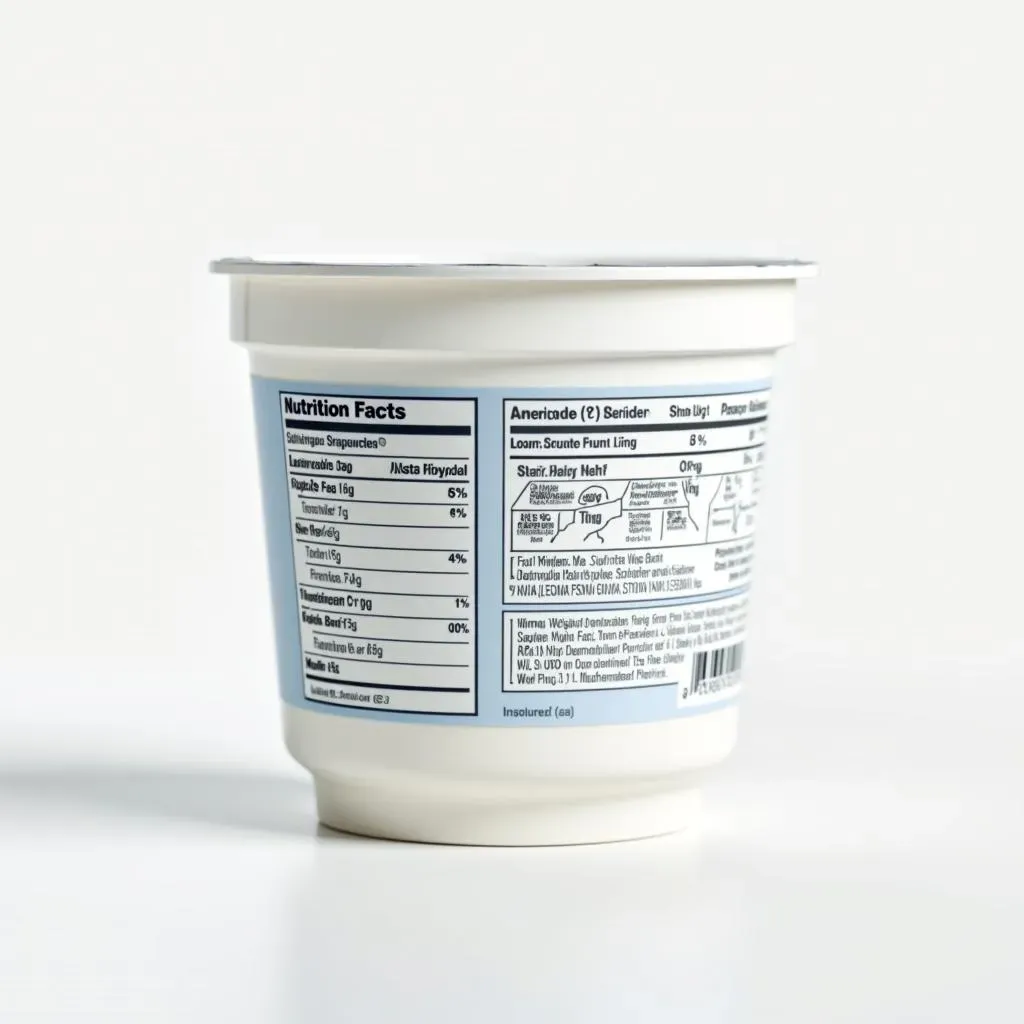Table of Contents
Got high cholesterol? You're likely getting bombarded with advice on what to cut out of your diet. But what about adding something *in*? Specifically, could low fat yogurt be good for high cholesterol? It sounds almost too good to be true, right? A creamy, delicious snack that might actually help nudge those numbers in the right direction? This article dives deep into the connection between yogurt and cholesterol, separating fact from fiction. We'll explore what the research says about yogurt's potential impact on cholesterol levels and guide you through the confusing world of yogurt labels. Forget the sugary, processed stuff – we're talking about how to choose the healthiest, most effective yogurt options. Plus, you'll get tasty ideas to incorporate low fat yogurt into your diet, turning it from a bland health food into a satisfying part of your day. Ready to explore how this simple snack could be a secret weapon in your fight against high cholesterol?
Research: Can Yogurt Really Help Lower Cholesterol?

Research: Can Yogurt Really Help Lower Cholesterol?
The Yogurt-Cholesterol Connection: What the Studies Say
Alright, so you're wondering if yogurt can actually make a dent in your cholesterol levels. Good question! The research is still unfolding, but there are some interesting clues. Some studies have hinted at a link between regular yogurt consumption and healthier cholesterol profiles. We're talking about potentially lower LDL ("bad") cholesterol and maybe even a boost in HDL ("good") cholesterol. One study even suggested that folks who eat yogurt regularly tend to have a better metabolic profile overall. Think lower BMI and healthier waistlines, which are definitely good news for your heart.
Now, before you go stocking up on every yogurt you can find, it's crucial to understand that these studies don't necessarily prove that yogurt *causes* lower cholesterol. It could be that people who eat yogurt also tend to have healthier diets and lifestyles in general. Also, is it the yogurt itself, or the probiotics within that's making the difference? That's the million-dollar question researchers are still trying to answer.
Probiotics: The Unsung Heroes of Yogurt?
Speaking of probiotics, they're the live bacteria that are naturally present in many types of yogurt. And they might be the key to yogurt's potential cholesterol-lowering effects. Some research suggests that certain strains of probiotics can help reduce cholesterol absorption in the gut or even break down cholesterol molecules. One study found that people with high cholesterol who ate yogurt containing specific microencapsulated probiotics saw a noticeable reduction in both total and LDL cholesterol compared to those who ate yogurt without probiotics.
However, not all yogurts are created equal when it comes to probiotics. The type and amount of probiotics can vary widely depending on the brand and how the yogurt is made. Plus, keep in mind that the FDA doesn't regulate probiotics, so it can be tough to know exactly what you're getting. So, while the probiotic angle is promising, more research is needed to pinpoint which strains are most effective and how much you need to consume to see a benefit.
Decoding Yogurt Labels: Finding the Best Low Fat Yogurt for Cholesterol

Decoding Yogurt Labels: Finding the Best Low Fat Yogurt for Cholesterol
Sugar Content: The Sneaky Culprit
Alright, let's get real about yogurt labels. You might think you're grabbing a healthy snack, but some yogurts are basically dessert in disguise. Added sugar is a HUGE problem, especially when you're trying to manage cholesterol. Many flavored yogurts are loaded with it, which can negate any potential benefits from the probiotics or other nutrients. Remember, too much sugar can raise triglyceride levels, another type of fat in your blood that can contribute to heart disease. So, Rule #1: become a sugar detective!
Scan those labels like your life depends on it (well, kind of!). Look for yogurts with the *lowest* amount of added sugar. Ideally, you want to aim for plain, unsweetened varieties. Yes, they might taste a little bland at first, but trust me, your taste buds will adjust. And you can always add your own healthy flavorings, which we'll get to later. Remember those yogurt drinks? They can be even worse offenders when it comes to sugar, so read those labels extra carefully!
Yogurt Type | Typical Added Sugar (per serving) |
|---|---|
Plain, Nonfat Yogurt | 0-5 grams |
Flavored Yogurt (fruit, vanilla, etc.) | 15-25+ grams |
Yogurt Drinks | 20-30+ grams |
Fat Content: Low Fat vs. Full Fat
Next up: fat. This is where things get a little more nuanced. For years, we've been told that low fat is the way to go, especially for heart health. And when it comes to yogurt, that's generally still good advice. Saturated fat can raise LDL cholesterol, so choosing low fat or nonfat yogurt is a smart move. However, some recent research suggests that not all saturated fats are created equal, and that the saturated fat in dairy might not be as harmful as once thought. Some studies even suggest that full-fat dairy might have some benefits.
However, until the science is clearer, it's probably best to stick with low fat or nonfat yogurt, especially if you're already watching your cholesterol. But don't go overboard trying to eliminate all fat from your diet. Healthy fats, like those found in avocados, nuts, and olive oil, are essential for overall health.
Low Fat Yogurt vs. Full Fat: What's the Cholesterol Connection?

Low Fat Yogurt vs. Full Fat: What's the Cholesterol Connection?
The Great Fat Debate: Yogurt Edition
so we've touched on fat content, but let's really dig into this low fat yogurt vs. full fat thing, especially when it comes to cholesterol. For years, the message has been crystal clear: saturated fat is the enemy, and you should avoid it like the plague if you're worried about your heart. That's why low fat and nonfat yogurt became the go-to choices for health-conscious folks. The thinking was simple: less saturated fat equals lower LDL cholesterol.
But here's where things get a little more complicated. Some recent studies have started to challenge the idea that all saturated fat is bad. Some researchers are suggesting that the type of saturated fat found in dairy products might not be as harmful as the saturated fat found in, say, processed meats. Some studies have even hinted at potential benefits from full-fat dairy, like improved HDL cholesterol levels or better blood sugar control. However, this research is still relatively new, and the overall picture is far from clear. What do you think about this?
Making the Right Choice for You
So, what does all this mean for you and your yogurt habit? Well, if you're already struggling with high cholesterol, it's generally still a good idea to stick with low fat yogurt. The established link between saturated fat and LDL cholesterol is pretty solid, and it's better to err on the side of caution. However, if your cholesterol levels are in a healthy range and you enjoy full-fat yogurt, it might not be necessary to make the switch. But moderation is key! And always keep an eye on the added sugar content, no matter what type of yogurt you choose.
- If you have high cholesterol: Opt for low fat or nonfat yogurt to minimize saturated fat intake.
- If your cholesterol is healthy: Full-fat yogurt might be okay in moderation, but still prioritize low added sugar.
- Always read the label: Pay attention to both saturated fat and added sugar content.
Ultimately, the best choice depends on your individual health situation and your personal preferences. Talk to your doctor or a registered dietitian for personalized advice.
Beyond the Bowl: Delicious Ways to Enjoy Low Fat Yogurt for Heart Health

Beyond the Bowl: Delicious Ways to Enjoy Low Fat Yogurt for Heart Health
Get Creative with Your Toppings
let's be honest, plain low fat yogurt can be a little…boring. But that doesn't mean you have to choke it down! The beauty of plain yogurt is that it's a blank canvas for flavor. Instead of buying those sugary flavored yogurts, take control and create your own delicious and heart-healthy combinations. Think fresh berries bursting with antioxidants, a sprinkle of crunchy nuts for healthy fats, or a drizzle of honey for a touch of sweetness. The possibilities are endless!
Want to get really fancy? Try adding a spoonful of chia seeds for extra fiber and omega-3s, or a dash of cinnamon for its anti-inflammatory properties. You can even get savory with it! A dollop of plain yogurt with some chopped cucumber, dill, and a squeeze of lemon makes a refreshing and healthy dip for veggies.
Yogurt Beyond Breakfast: Snacking and Cooking Ideas
Who says yogurt is just for breakfast? It's a versatile ingredient that can be used in all sorts of creative ways. Swap out sour cream for plain yogurt in your favorite dips and sauces for a lower-fat alternative. Use it as a marinade for chicken or fish to tenderize the meat and add a tangy flavor. Or blend it into smoothies for a creamy, protein-packed boost.
Feeling adventurous? Try making your own frozen yogurt! Simply blend plain yogurt with your favorite fruits and a touch of sweetener, then freeze it for a few hours. It's a healthy and delicious treat that's perfect for a hot day. You can even use yogurt as a base for healthy desserts, like parfaits or overnight oats. The key is to think outside the box and experiment with different flavors and textures.
Yogurt Use | Benefit |
|---|---|
Smoothie ingredient | Adds protein and creaminess |
Dip or sauce base | Lower-fat alternative to sour cream |
Marinade | Tenderizes meat and adds flavor |
Frozen yogurt | Healthy and delicious dessert |
Making Yogurt Work for You: A Holistic Approach to Cholesterol Management

Making Yogurt Work for You: A Holistic Approach to Cholesterol Management
Yogurt as Part of a Heart-Healthy Lifestyle
So, can yogurt single-handedly cure your high cholesterol? Probably not. But can it be a valuable tool in your cholesterol-lowering arsenal? Absolutely! Think of making yogurt work for you as part of a bigger, holistic approach to heart health. It's not just about adding a daily dose of yogurt and expecting miracles. It's about combining yogurt with other healthy habits to create a powerful synergy that benefits your entire body.
That means focusing on a balanced diet rich in fruits, vegetables, and whole grains. It means getting regular exercise, managing stress, and quitting smoking if you're a smoker. And it means working closely with your doctor to monitor your cholesterol levels and make any necessary medication adjustments. Yogurt can be a delicious and nutritious addition to this healthy lifestyle, but it's not a magic bullet. It's one piece of the puzzle.
Beyond Diet: Maximizing Yogurt's Benefits
To really maximize the benefits of yogurt, think beyond just what you're eating with it. Consider the timing of your yogurt consumption. Some experts suggest that eating yogurt with meals can help improve nutrient absorption. Also, be mindful of what you're *not* eating. If you're loading up on processed foods, sugary drinks, and unhealthy fats, a daily serving of yogurt isn't going to make much of a difference.
And don't forget about the importance of sleep and stress management. Chronic stress can raise cholesterol levels, so finding healthy ways to relax and unwind is crucial. Whether it's yoga, meditation, or spending time in nature, find what works for you and make it a priority. Also, consider consulting with a registered dietitian or nutritionist. They can help you create a personalized meal plan that incorporates yogurt and other heart-healthy foods in a way that meets your specific needs and goals.
Lifestyle Factor | Impact on Cholesterol | How Yogurt Can Help |
|---|---|---|
Diet | Unhealthy fats and added sugar can raise LDL cholesterol. | Yogurt can be a healthy, low-fat, low-sugar alternative to less nutritious snacks. |
Exercise | Lack of exercise can negatively impact cholesterol levels. | Yogurt provides protein for muscle recovery after workouts. |
Stress | Chronic stress can raise cholesterol levels. | Yogurt can be a calming and satisfying snack. |
Sleep | Poor sleep can negatively impact cholesterol levels. | Yogurt can be a source of tryptophan, which may promote sleep. |
Yogurt: A Delicious Part of a Heart-Healthy Lifestyle
So, is low fat yogurt a magic bullet for high cholesterol? Probably not. But, the evidence suggests that incorporating it into a balanced diet can be a beneficial step. Choosing plain, nonfat varieties and loading up on your own healthy toppings allows you to control sugar intake and maximize the nutritional benefits. While yogurt may not single-handedly solve your cholesterol woes, it's a tasty and versatile food that offers a range of health advantages. From probiotics to protein, yogurt can be a valuable part of a heart-healthy lifestyle. Always remember to consult with your doctor or a registered dietitian for personalized advice on managing your cholesterol levels.
